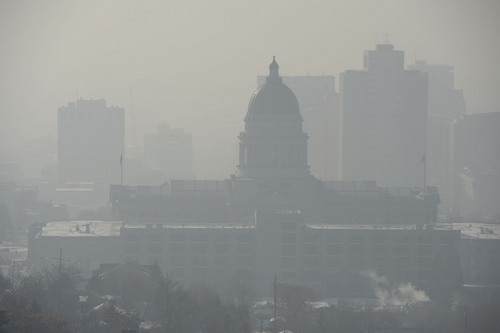This is an archived article that was published on sltrib.com in 2014, and information in the article may be outdated. It is provided only for personal research purposes and may not be reprinted.
On paper, Utah has claim to being among the most efficiently managed states and one of the best places to do business. Taxes are low. Government is lean. The books balance.
Which would all be wonderful. If people lived on paper. Or breathed it. But for a state with such chronic and serious air quality problems to pat itself on the back about how well it is run is an exercise in horrid self-delusion.
The print on another piece of paper — the American Lung Association's annual ranking of the Most-Polluted Cities — makes it clear that all the happy talk about how well this state is run is seriously misplaced.
The rankings that Gov. Gary Herbert and others proudly point to when bragging about what a good job they are doing keeping the checkbook or minimizing the number of people it takes to issue you a license plate are fine as far as they go. But they don't go far enough. Not by a long shot.
If all a state has to do is pave roads, issue licenses, lock the doors at the prison and fly the flag in front of the Capitol, Utah deserves to be ranked in the top tier of states.
But if it is the state's responsibility to aggressively protect the health and safety of its residents — not just from the occasional petty criminal, but from industrial and automotive air pollution that ranks Salt Lake City as the 8th dirtiest city in the nation for air quality — then there is a lot of work to be done for Utah to be able to claim such a lofty position.
Unless efficiency means a plan to succeed at doing very little. Or business-friendly means polluter-friendly.
Herbert, to his credit, has made some good stabs at addressing the problem. He has ordered things he has the power to order by himself, again with an efficiency expert's point of view, pushing state agencies to at least reduce the degree to which their motor vehicle use is part of the problem.
And Herbert did ask the Legislature to give his Department of Environmental Quality more power to move past the slow-moving, one-size-fits-all rules of the federal Environmental Protection Agency and make rules specific to Utah's geographic and metrological woes. And to accelerate enforcement of federal rules that will make motor fuels, and the cars that burn them, much less dirty.
The Legislature refused.
As long as lawmakers refuse to move on such matters, and the governor is not able to push them, claims that Utah could take on more responsibilities — that it could, for example, better manage federally owned public lands — are a cruel joke.
And the brag that the state is well run is just not true.



